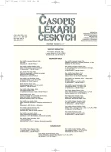-
Medical journals
- Career
National Database of Genotypes – ethical and legal issues
Authors: Věra Franková 1; Jolana Těšínová 2; Radim Brdička 3
Authors‘ workplace: Univerzita Karlova v Praze, 1. lékařská fakulta, Ústav pro humanitní studia v lékařství a Ústav dědičných metabolických poruch 1; Univerzita Karlova v Praze, 1. lékařská fakulta, Ústav veřejného zdravotnictví a medicínského práva 2; Ústav experimentální medicíny AV ČR a Ústav hematologie a krevní transfuze, Praha 3
Published in: Čas. Lék. čes. 2011; 150: 372-375
Category: Topic
Overview
The aim of the project National Database of Genotypes is to outline structure and rules for the database operation collecting information about genotypes of individual persons. The database should be used entirely for health care. Its purpose is to enable physicians to gain quick and easy access to the information about persons requiring specialized care due to their genetic constitution. In the future, another introduction of new genetic tests into the clinical practice can be expected thus the database of genotypes facilitates substantial financial savings by exclusion of duplicates of the expensive genetic testing. Ethical questions connected with the creating and functioning of such database concern mainly privacy protection, confidentiality of personal sensitive data, protection of database from misuse, consent with participation and public interests. Due to necessity of correct interpretation by qualified professional (= clinical geneticist), particular categorization of genetic data within the database is discussed. The function of proposed database has to be governed in concordance with the Czech legislation together with solving ethical problems.
Key words:
database of genotypes, ethics, legal regulations in the Czech Republic.
Sources
1. Hayry M, et al. The Ethics and Governance of Human Genetic Databases: European Perspectives. Cambridge: Cambridge University Press 2007.
2. Murray T. Genetic Exeptionalism and “Future Diaries”: Is Genetic Information Different from Other Medical Information? In: Rothstein. Genetic Secrets. Yale: University Press 1997; 61.
3. Franková V. Interpret – jedna z rolí klinického genetika. Čas Lék čes 2007; 146 : 840–843.
4. Společnost lékařské genetiky ČLS JEP. Doporučení týkající se informovaného souhlasu pro genetická laboratorní vyšetření, http://www.slg.cz/app/clanek/35/ doporuceni_slg_k_is
5. Nordal S. Privacy. In: Hayry M, et al. The Ethics and Governance of Human Genetic Databases: European Perspectives. Cambridge: Cambridge University Press 2007; 181–198.
6. McGuire A, et al. Research ethics and the chalenge of the whole genome sequencing. Nat Rev Gen 2008; 9 : 152–156.
7. Convention on the Protection of Human Rights and Dignity of the Human Being with Regard to the Application of Biology and Medicine: Convention on Human Rights and Biomedicine, Oviedo, 4 April 1997, ETS 164m art 11.
8. UNESCO. The Universal Declaration on the Human Genome and Human Rights, adopted by General Conference of Unesco at its 29th Session on 11 November 1997, art 6.
9. O’Neill O. Informed Consent and Genetic Information. Stud Hist Phi Biol Biomed Sci 2001; 32 : 689–704.
10. Árnason V. Introduction: some lessons of ELSAGEN. In Hayry M, et al. The Ethics and Governance of Human Genetic Databases: European Perspectives. Cambridge: Cambridge University Press 2007; 5.
11. Hayry M, Takala, T. American principles, European values and the mezzanine rules of ethical genetic databanking. In: Hayry M, et al. The Ethics and Governance of Human Genetic Databases: European Perspectives. Cambridge: Cambridge University Press 2007; 11–41.
Labels
Addictology Allergology and clinical immunology Angiology Audiology Clinical biochemistry Dermatology & STDs Paediatric gastroenterology Paediatric surgery Paediatric cardiology Paediatric neurology Paediatric ENT Paediatric psychiatry Paediatric rheumatology Diabetology Pharmacy Vascular surgery Pain management Dental Hygienist
Article was published inJournal of Czech Physicians

-
All articles in this issue
- National Database of Genotypes – ethical and legal issues
- Current alternatives in the surgical treatment of chronic pancreatitis – a review article
- International health statistics databases and available data
- Interest of physicians in the position at the medical advisory panel
- Thyreopathy examination during pregnancy – results of pilot project
- Subjective well-being, morbidity and health care consumption by hazardous, harmful and problem alcohol drinkers
- Journal of Czech Physicians
- Journal archive
- Current issue
- Online only
- About the journal
Most read in this issue- Current alternatives in the surgical treatment of chronic pancreatitis – a review article
- International health statistics databases and available data
- Thyreopathy examination during pregnancy – results of pilot project
- National Database of Genotypes – ethical and legal issues
Login#ADS_BOTTOM_SCRIPTS#Forgotten passwordEnter the email address that you registered with. We will send you instructions on how to set a new password.
- Career

